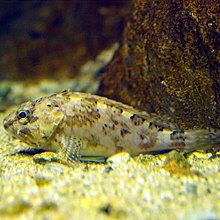Sebastiscus

| Sebastiscus | |
|---|---|
 | |
| False kelpfish, Sebastiscus marmoratus | |
| Scientific classification | |
| Domain: | Eukaryota |
| Kingdom: | Animalia |
| Phylum: | Chordata |
| Class: | Actinopterygii |
| Order: | Scorpaeniformes |
| Family: | Scorpaenidae |
| Subfamily: | Sebastinae |
| Tribe: | Sebastini |
| Genus: | Sebastiscus D. S. Jordan & Starks, 1904 |
| Type species | |
| Sebastes marmoratus | |
Sebastiscus is a genus of marine ray-finned fish belonging to the subfamily Sebastinae part of the family Scorpaenidae. These fishes are native to the western Pacific Ocean. They are collectively called sea ruffes and resemble the rockfishes in the genus Sebastes, but are usually smaller and have a different pattern.
Taxonomy
[edit]Sebastiscus was first formally described as a subgenus of Sebastes by David Starr Jordan and Edwin Chapin Starks in 1904 with Sebastes marmoratus, which had been described by Georges Cuvier in 1829, as its type species. It was regarded as a subgenus up to 1984 when it was proposed as a valid genus,[2] albeit within the same tribe Sebastini as the speciose genus Sebastes, which is one of the tribes of the subfamily Sebastinae within the family Scorpaenidae and the order Scorpaeniformes.[3] but other authorities place it in the Perciformes in the suborder Scorpaenoidei.[4]
Species
[edit]There are currently four recognized species in this genus:[5][6]
| Image | Scientific name | Common Name | Distribution |
|---|---|---|---|
 | Sebastiscus albofasciatus (Lacépède, 1802) | Western Pacific off the coast of China, Japan, and Korea | |
 | Sebastiscus marmoratus (G. Cuvier, 1829) | False kelpfish, Japanese sea ruffe | Western Pacific from southern Japan to the Philippines. |
 | Sebastiscus tertius (Barsukov & L. C. Chen, 1978) | Western Pacific | |
| Sebastiscus vibrantus Morishita, Kawai & Motomura, 2018 | Western Pacific |
Characteristics
[edit]Sebastiscus was described by Jordan and Starks as being similar to the subgenus Sebastodes of the genus Sebastes, the Pacific rockfishes were considered to be separate from the Atlantic redfishes which bore the generic name Sebastes. They also stated that these fishes bore a close resemblance to the fishes in the subgenus Pteropodus but differed in the possession of 12 dorsal fin spines and in the vertebrae count. These characteristics were thought to be similar to the genus Scorpaena. Sebastiscus was differentiated from Helicolenus by having a well developed swim bladder.[7]
Distribution and habitat
[edit]Sebasticus species are found in the western Pacific Ocean from Japan and Korea south to the Philippines.[5] Extralimital records of S. marmoratus in Australia and Norway are thought to probably be a result of fish being transported to these locations in the ballast water of ships.[8][9] They are shallow water coastal species.[7]
References
[edit]- ^ Kendall Jr, Arthur W. (2000). "An historical review of Sebastes taxonomy and systematics" (PDF). Marine Fisheries Review. 62 (2): 1–23.
- ^ Eschmeyer, William N.; Fricke, Ron & van der Laan, Richard (eds.). "Genera in the family Sebastidae". Catalog of Fishes. California Academy of Sciences. Retrieved 18 December 2021.
- ^ J. S. Nelson; T. C. Grande; M. V. H. Wilson (2016). Fishes of the World (5th ed.). Wiley. pp. 468–475. ISBN 978-1-118-34233-6.
- ^ Ricardo Betancur-R; Edward O. Wiley; Gloria Arratia; et al. (2017). "Phylogenetic classification of bony fishes". BMC Evolutionary Biology. 17 (162). doi:10.1186/s12862-017-0958-3. PMC 5501477.
- ^ a b Froese, Rainer; Pauly, Daniel (eds.). "Species in genus Sebastiscus". FishBase. August 2021 version.
- ^ Eschmeyer, William N.; Fricke, Ron & van der Laan, Richard (eds.). "Species in the genus Sebastiscus". Catalog of Fishes. California Academy of Sciences. Retrieved 22 December 2021.
- ^ a b Arthur W. Kendall Jr. (2000). "An Historical Review of Sebastes Taxonomy and Systematics" (PDF). Marine Fisheries Review. 62 (2).
- ^ Bray, D.J. (2021). "Sebastiscus marmoratus". Fishes of Australia. Museums Victoria. Retrieved 21 December 2021.
- ^ Haakon Hansen; Egil Karlsbak (2018). "Pacific false kelpfish, Sebastiscus marmoratus (Cuvier, 1829) (Scorpaeniformes, Sebastidae) found in Norwegian waters". BioInvasions Records. 7 (1): 73–78. doi:10.3391/bir.2018.7.1.11.
External links
[edit] Media related to Sebastiscus at Wikimedia Commons
Media related to Sebastiscus at Wikimedia Commons